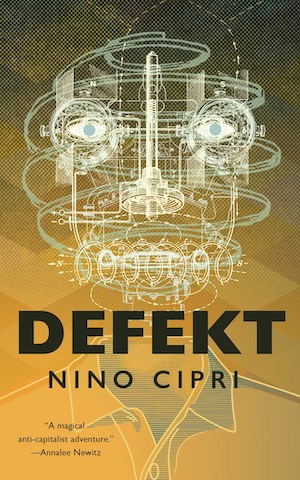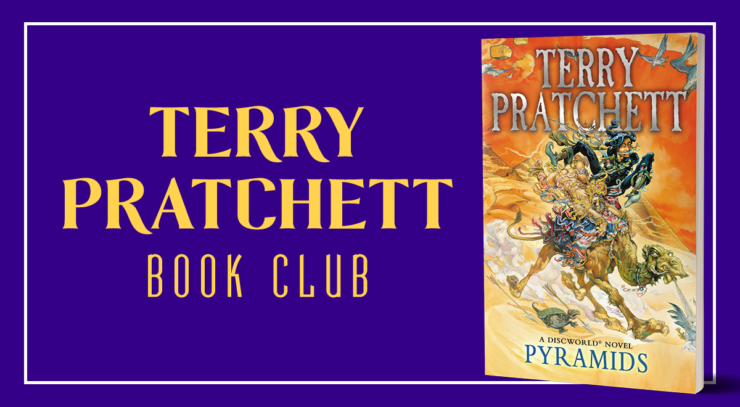It’s time to figure out how to fix that dimension pyramid snafu in the final book of Pyramids: “The Book of 101 Things A Boy Can Do”.
Summary
Teppic and You Bastard have accidentally wandered into a little side dimension containing the Sphinx, which gives him the old “what walks on four legs in the morning” riddle. Teppic doesn’t get it, but then argues that the riddle is frankly a bit too broad in its assumptions about time and insists that the riddle needs alteration. By the time they’ve finished the conversation, the Sphinx doesn’t remember telling him the answer, so he’s able to give it again and they leave for the proper dimension. The priests of Djelibeybi are at a loss because the gods won’t listen to them, and they have no king to intercede on their behalf. In the old days sometimes a king would be sacrificed—in his place, they think perhaps Dios would do. He’s just about to agree when the legions of mummies appear. They go to break into the pyramid of the very first pharaoh, Khuft, but they find that the pyramid isn’t like the rest, and doesn’t appear to keep its occupant inside like the others do. They form a chain of ancestors to decipher what is written on the walls.
Teppic is back. He rides You Bastard back to his stable and heads into the palace. He finds the gold mask of the king and thinks to scratch it with a knife. The gold peels off revealing lead underneath. There’s no one in the palace, so he goes down to the bank of the river where the people are gathered, and asks what has happened. He’s told that the priests went to talk to the dead, but they’ve taken all the boats, so he can’t go after them. He feels his divinity and makes a gesture to part the water, which works, and he walks across to the other side of the river. He arrives in the City of the Dead and parkours his way toward the new pyramid, then finds Ptaclusp and asks about how they might change the pyramid to fix this mess. Outside this dimension, Tsort and Ephebe are preparing to fight, each by making wooden horses. They all pile inside them and wait.
Buy the Book


Defekt
The ancestors go to confront the priests, and the truth finally comes out: Dios has been alive at least seven thousand years, and he won’t let them destroy the pyramids because then the country would just be a small changeable place. They all realize that Teppic is working to flare off the pyramid, and when the other priests realize that the king is alive, they think perhaps they ought to let Teppic get on with it, even if Dios is against the idea. The gods are coming across the river to stop him, however, and Dios isn’t going to stop them. So the ancestors turn their attention to family. They defend him as he undoes the pyramid and sends them back to their dimension. The pyramid explodes and people land back where they should be. Teppic makes an effort, and the sun comes up. The kingdom reappears and ruins any potential for war between Tsort and Ephebe.
Teppic is busy being king and giving orders, while Dios is nowhere to be found. Chider arrives and delivers Ptraci to him, rolled up in a carpet. He insists that he could abdicate the throne and they could leave together—he could perhaps figure out who his relatives are by asking who has the dream about cows, which Ptraci admits to having dreams about as well. And that is how they find out that they’re brother and sister. Teppic leaves the kingdom to Ptraci and decides to leave. Koomi asks to be high priest, which Ptraci grants, but she plans to be queen quite differently, and won’t be upholding any of the old traditions. She tells Koomi to take care of that himself and also to shut up. Ptaclusp and his sons are doing wonderfully, planning to build bridges over the Djel and figuring out the kingdom finances on the queen’s behalf. The ancestors queue up to finally go with Death. Ptraci tries to convince Teppic not to leave the kingdom, but he has no desire to stick around. Dios awakens on the river bank, takes stock of the world around him, and goes forth.
Commentary
Kinda feeling like a broken record at this point but… this is the Greek sphinx. Not the Egyptian sphinx. It’s got the lion body and the wings and lady head, and it asks a riddle, which is the whole myth around the Sphinx that guards the city of Thebes. The Egyptian sphinx has the head of (probably) a pharaoh, and the body of a lion, and it doesn’t ask you anything. There’s a joke in here that the sphinx makes about how no one “gets the nose right”, which is probably meant to be a sly wink toward the fact that the Great Sphinx of Giza is missing a nose, but this isn’t the Egyptian sphinx, so the whole thing is kind of a bust. I feel like a grump going off about this, but if you’re just going to mix these things as though it’s all the same, you have to know that it’s not always going to work, and this is definitely one of those places.
I think this could have worked if the historical alignment had been a little bit sharper in its execution, but then you would’ve had to make some sect of the Ephebians the rulers of Djelibeybi at this point in their history, or something down that road. Smashing it all together is weirdly sloppy for Pratchett, and it takes away from the book’s overall impact as a complete story. It’s distracting because he keeps using Greek references all over the place; Ozymandias is name-checked, which is the Greek name for Ramesses II; Ptraci is rolled up in a carpet when she presents herself to Teppic at the end, just like Cleopatra was said to have done when she wanted to be smuggled in to see Julius Caesar. The only non-Hellenized reference here that really stands out is the first ancestor Khuft, who I imagine is meant to be a stand-in for the pharaoh Khufu.
Then it gets even messier with a biblical reference when Teppic parts the river, which sure didn’t happen on the Nile in the Bible, so who can say what we’re going for at that point. I know it’s not the only story where waters part, but you have to know that’s the first one that’s going to come to mind when you invoke both Egypt and god powers.
On some level, I understand the impulse—we don’t have the same level of detail on many parts of Egyptian history because it goes back so much farther than most records on ancient civilizations in that area of the world. But if that’s the hold up, then don’t bother with a culture based on Egypt, just make one based on ancient Greece and call it a day. Part of the problem is in how the pyramids themselves are being used, acting as this symbol in the story for holding onto the past and refusing to change. It’s not an effective metaphor for multiple reasons, the first being that we’re not entirely sure what the pyramids meant to the Egyptians, or why they were chosen as burial monuments in the first place. Moreover, the Egyptians moved away from building pyramids without any notable strife; they shifted away from pyramids to burials in the Valley of the Kings during their Eighteenth Dynasty. Maybe this seems too granular, but these concepts just don’t align neatly enough, and often aren’t related at all.
It’s too bad because the themes of the book certainly aren’t poor ones. We could all use a reminder now and then that tradition for tradition’s sake is not a reason to do anything, that power isn’t eternal, and that we cultivate resilience by refusing to fear what is new. There’s some scholarship via Stefan Eckman about the kingdom being a sort of “time polder”, described as a sort of bubble where history is locked into a pattern (largely due to Dios in this case), and that’s an interesting conceit. But the story doesn’t really land the way it could because its foundation is too precarious. Even the question of the dimensions created by the pyramid, the ideas that IIb goes on about to his father—which seems like it could be a ribbing at concepts found in various forms of pyramidology—don’t ultimately go anywhere.
I’m not saying that there’s a reason why Pratchett didn’t return to this part of Discworld… but I’m kinda saying that.
Asides and little thoughts:
- The title of this section (The Book of 101 Things A Boy Can Do) is a parody of those books like 101 Things For a Boy to Make. That particular title is from 1930, but I remember having one myself called something like 50 Things a Kid Can Do to Save the Earth, so it’s a genre of sorts.
- The segments that describe Teppic’s parkouring capabilities are really some of my favorite bits in the book, particularly “finding handholds that would have perplexed a gecko”… but that’s just because I have an abiding love of geckos.
- It’s suggested that the idea of a swiftly reappearing valley can also be found in R. A. Lafferty’s “Narrow Valley”, but it really puts you in mind of any vanishing and reappearing land, like Brigadoon or even Hamunaptra in The Mummy (though there’s a mechanical reason for that in part).
Pratchettisms:
This means either that the universe is more full of wonders than we can hope to understand or, more probably, that scientists make things up as they go along.
However, it was one thing for the gods to ignore you when they were far off and invisible, and quite another when they were strolling across the landscape. It made you feel such a fool.
How did you kill a pyramid?
There was a damp sucking noise, and the waters of the Djel parted in front of him.
And connoisseurs of mankind’s tendency to put his pedal extremity where his tongue should be are that when the judges’ envelopes are opened then Hoot Koomi’s fine performance in “Begone from this place, foul shades” will be a contender for all-time bloody stupid greeting.
The trouble with gods is that after enough people start believing in them, they begin to exist. And what begins to exist isn’t what was originally intended.
Eventually it condescended to drop out of the cosmic scale and became, simply, the loudest noise anyone hearing it had ever experienced.
Teppic sat on the throne and watched the life of the kingdom reassemble itself, like a smashed mirror that is put together again and reflects the same old light in new and unexpected ways.
And now we’ve finally arrived at the very first City Watch book… Make sure you’re back next week for Guards! Guards! We’ll read all the way up to “Shut up, Brother Dunnykin.”










